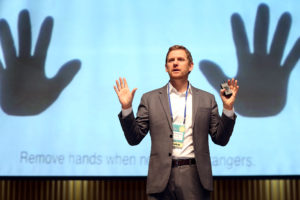About me
Short bio
Charles Montgomery is an award-winning author and urbanist who leads transformative experiments, research and interventions to improve human wellbeing. His acclaimed book, Happy City, Transforming Our Lives Through Urban Design, examines the intersection between urban design and the emerging science of happiness.
Charles works with cities, organizations and citizens around the world to improve human wellbeing. His collaborators include the World Health Organization, the Guggenheim Museum and local governments in Canada, the USA, Mexico, New Zealand, the UAE and Poland. Charles is a member of the Global Happiness Council’s sub-council for happy cities. Among his numerous awards is a Citation of Merit from the Canadian Meteorological and Oceanographic Society for outstanding contribution towards understanding of climate change science.
Long bio
Charles Montgomery uses research, storytelling, public experiments and collaborative design to help people live better together.
His award-winning essays and books combine investigative reporting with true stories to explore the connection between culture, science, design and human wellbeing. He is the author of the acclaimed books The Last Heathen and Happy City, about which The New York Times wrote: “Happy City raises issues most of us have avoided for too long. Do we live in neighborhoods that make us happy? That is not a silly question. Montgomery encourages us to ask it without embarrassment, and to think intelligently about the answer.”
His first book, The Last Heathen, won the 2005 Charles Taylor Prize for Literary Non-fiction, among other awards. His journalism has appeared in The Guardian, Readers Digest, Salon, The Globe and Mail, The National Post, The Walrus, Quartz, Dwell, Fastco, Canadian Geographic, Outside, Explore, Canadian Business and The South China Morning Post. Among his awards is a Citation of Merit from the Canadian Meteorological and Oceanographic Society for outstanding contribution towards public understanding of climate change science.
Building on his research, Charles collaborates on experiments that challenge us to see our cities—and ourselves—in entirely new ways. His Home for the Games charity led hundreds of people to follow his example and open their homes to strangers during the Vancouver 2010 Olympics. Working with the BMW Guggenheim Lab and the citizens of New York City, he transformed an empty lot into a machine to boost feelings of trust and altruism. With the Museum of Vancouver, he turned a busy downtown street into an adult playground using giant recycled foam building blocks. Each experiment is driven by insights from the science of human wellbeing.
Charles is the co-founder of Happy Cities, an interdisciplinary team that uses evidence, engagement and design to nurture happier, healthier, more inclusive communities. He and his team have helped transform urban spaces on four continents. They developed the world’s first Happy Neighbourhood design guidelines for the government of the United Arab Emirates. They helped British Land, the UK’s biggest property developer, become leaders in designing places for wellbeing. Working with neuroscientists at the Urban Realities Laboratory, Happy Cities developed new methods to measure the emotional effects of public space. The team also helped produce the world’s first cohousing lite community in Vancouver. The Canadian Institute of Planners awarded Happy Cities with the 2020 Healthy Communities Planning Award for Planning Excellence.
Charles grew up on a small farm on Vancouver Island. As a gay man, he learned to appreciate the ways that society includes or excludes people based on their identity. That knowledge has shaped his interest in themes of social trust and inclusion. He feels most at home in Vancouver, Mexico City and in the Cowichan Valley. He is a member of Little Mountain Cohousing, an intentional community in the heart of Vancouver.
Charles is grateful to live, work and play on the traditional unceded territories of the xʷməθkʷəy̓əm (Musqueam), Sḵwx̱wú7mesh (Squamish), and Sel̓íl̓witulh (Tsleil-Waututh) Nations.



